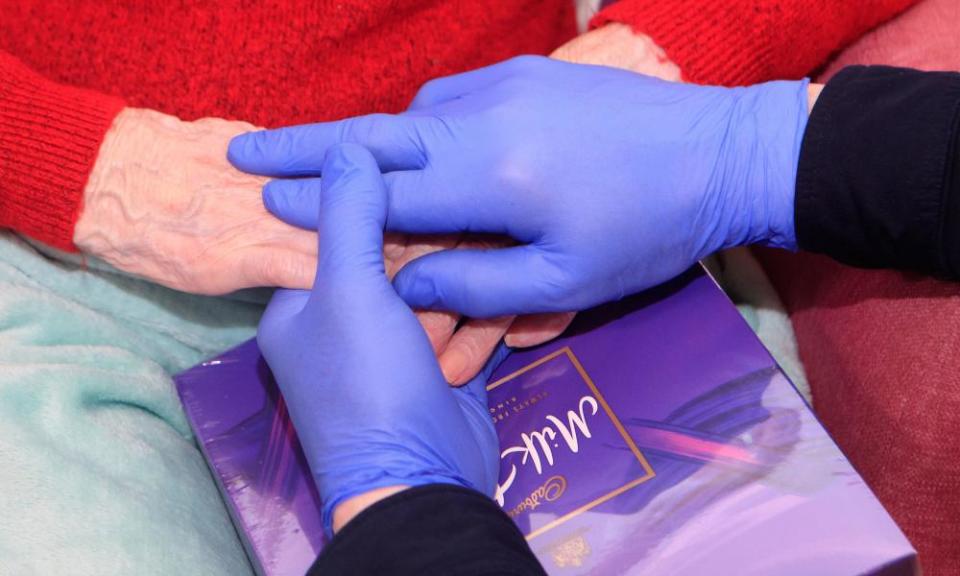‘Poorly thought through’: frustration over England’s care home visit rules

From 12 April, care home residents in England will be able to receive two named, regular visitors – up from one allowed at present. Also, babies and children under the age of two will be able to accompany visitors, so grandparents can meet grandchildren born during Covid lockdown.
While the policy offers a long-awaited easing of visiting restrictions, some families have said it does not go far enough. Three people whose loved ones live in care homes speak about how the change in policy will affect their family.
‘She has dementia, but she remembers all the family. She can’t wait’
On Monday, 84-year-old Cath will meet her one-year-old great-grandson for the first time. Her daughter Jayne Maddison will also be able to see Cath for the first time in more than a year.
“She has been so sad it’s unbearable,” said Maddison, 58, who lives in Nottingham. “She went into a home not long before Covid started, and then couldn’t see anyone, it was dreadful. She has a great-grandson who has just turned a year old. She’s seen him through the window, and that was quite emotional. She has dementia, but she remembers all the family. She can’t wait. [The policy] will have a big impact on us, and many other families.”
While Maddison said she “cannot praise the care home enough”, the lockdown has been difficult for Cath. Her South Yorkshire care home had a Covid outbreak, with Cath contracting the disease and losing two close friends to the virus. This experience, combined with missing her family, has meant Cath has been “really going downhill”.
“She wasn’t eating and was very depressed,” said Maddison. “I hope it’ll just change her demeanour and outlook and everything. When we have seen her through the window, she doesn’t quite understand why we can’t come in. I’m just relieved this is finally happening … I was talking to her doctor last week, and he said it’ll do her the world of good.”
‘Mum would much prefer to have taken the risk right the way through’
For others, the policy poses difficult questions over which family members can take the two designated visitor spots.
Geoff Pringle, 65, has three siblings and all four are close to their 94-year-old mother, who lives in a care home in south-west England. They desperately want to see their mother but have been forced to decide who is allowed to visit.
“This is so poorly thought through and may cause divisions in families,” said Pringle, who lives in Devon. “My mum is bed-bound, frail and has numerous health issues. The sadness for Mum is she will not be able to see two of her four children and cannot see any of her eight grandchildren, who are all adults.
“We telephone her, and she’s no idea when we were last there, but she says: ‘It’s so lovely to hear from you, when are you coming to see me?’ We tell fibs.”
Pringle’s mother also has 11 great-grandchildren, only two of whom will be allowed to visit.
While the siblings are close and have worked through it together, the decision on who can visit their mother has not been easy. There is also frustration that despite their mother having survived coronavirus and being fully vaccinated, and the siblings having had at least one dose, visits still are not possible for all of them.
“It’s extremely difficult. I’m really struggling with not being able to see her at 94,” Pringle said. “If you ask Mum, she would much prefer to have taken the risk right the way through. She’s right at the end of her life, and I think there’s a real balance [between the risks of coronavirus and] the welfare of residents and their families.”
default
‘She just wants to have a weekly trip in my car to look at the sea’
The change in policy does not provide new guidance on allowing residents to leave care homes for day trips. For Dr Christine Brown’s mother, who is 94, her only wish is to be able to spend some time outside the care home where she has lived since having a stroke last April.
“She hates being in the care home and regularly asks to end her life as she doesn’t want to live if she can’t be in her own flat. Yesterday she said to me: ‘I’ve got one leg in the grave, I just have to work out how I can get the other one in,’” said Brown. “The one thing she would like to do is go for a drive in the car with me to look at the sea at Polzeath, or go to the garden centre.”
Brown is a healthcare worker, so is tested twice a week for coronavirus. In her work as a consultant psychiatrist in a mental health ward, she regularly deals with cases of deprivation of liberty, and the restrictions her patients are under are assessed on a case-by-case basis, rather than with a blanket policy. She believes the same should be true of care homes.
“The homes are not being given enough guidance around what they can safely do for people once a stay-at-home order is ended,” she said. “I’m being told I can come in and visit but I’m not allowed to take her out. My mum may not have long left to be alive, she is dying of old age. The government’s insistence on blanket restrictions is increasing her suffering.”

 Yahoo Finance
Yahoo Finance 